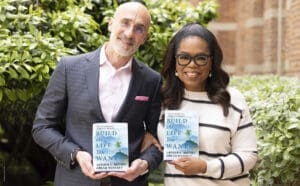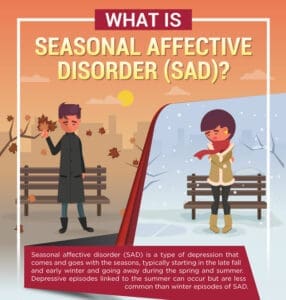Are you building the life you want as 2023 transitions into 2024?
This is a time of year perfect for reflection and optimism. As we begin the period of time when we hand off one year to the next, take a moment to consider your own mental health. How are you doing? Are you taking care of you? In this blog, CFR Staff Therapist L. Stewart Barbera Jr., PsyD, MSW uses the release of Arthur Brooks and Oprah Winfrey’s new book as a lens through which he asks us to consider this question: “Are you building the life you want as 2023 transitions into 2024?”

“Life starts all over again when it gets crisp in the fall.” – The Great Gatsby by F. Scott Fitzgerald (pictured here)
Why is fall a good time of year to consider if you’re building the life you want?
All of us yearn for a greater sense of well-being.
As fall begins, we notice that the days grow cooler, the sun sets sooner, and the trees are ablaze with vibrant hues of red, yellow, and orange. Autumn offers us its’ own unique gifts like a bountiful harvest of delicious apples, fall festivals, and gatherings with family and friends.
Like any change of season, fall provides us with the opportunity to pause and consider what matters most in our lives.
I was reminded of this when I read the recently published and widely acclaimed book, Building the Life You Want: The Art and Science of Getting Happier, by Arthur Brooks and Oprah Winfrey. Based on scientific literature of psychology and neuroscience this book provides a fascinating and informative exploration into what happiness is and what happiness is not.

(Pictured here) Building the Life You Want: The Art and Science of Getting Happier co-authors Arthur Brooks & Oprah Winfrey
Key Points from Building the Life You Want: The Art and Science of Getting Happier
Brooks and Winfrey suggest that happiness is comprised of enjoyment, satisfaction, and purpose. Perhaps more importantly, this book provides practical steps we can take to cultivate a life that leads to a greater sense of happiness.
While the authors recognize the importance of taking care of ourselves – like eating a healthy diet, getting the proper sleep, and exercising – the focus of the book is on managing our emotions and attending to behaviors that yield the dividend of happiness.
The first part of the book focuses on managing our emotions and nurturing virtues such as gratitude, humor, hope, and compassion. The second part of the book addresses what Brooks and Winfrey refer to as the four pillars of happiness, namely: family, friends, work, and faith. The authors reference the Harvard Study of Adult Development and they remind us that love is a wellspring that leads to happiness.
This book is a hope-filled reminder that there are small steps we can take each day to strengthen positive emotions like gratitude and joy. Likewise, there are things we can do to manage the negative emotions that we feel such as anger, anxiety, and sadness. The authors do not suggest that we can or even should eliminate unhappiness in our lives. Rather they offer suggestions that can help us manage life’s challenges and savor life’s gifts.

Infographic courtesy of Regis University.
Fall is the perfect season to build the life you want
We might consider the beginning of autumn to be our opportune time to step back and reflect on the many gifts that fill our days – from the extraordinary to the ordinary. Maybe this change of season can help us to also consider what changes we would like to make that may strengthen our relationships with family and friends, enhance our sense of meaning and satisfaction with work (whether paid or volunteer), and how we might enrich our experience of the sacred whatever our faith tradition or sense of self.
We also know that striving to improve our lives can sometimes be difficult. This is especially true when we face the headwinds of our circumstances and strained relationships, or when our feelings of anxiety or depression interfere with how we want to live our lives. It is precisely during those moments that we may need to remind ourselves that what can help us most is the support of others.
Life is a team sport. We don’t have to face challenges alone. And we can find a path forward.
Today, there are evidence-based strategies that can help us manage our feelings of anxiety and depression and enhance our relationships so that we can build the life we long for and experience a greater sense of happiness that Brooks and Oprah describe.
Council for Relationships can be one of those sources of support. May this autumn be a time of growth for your journey toward building the life you desire.
About the Author
L. Stewart Barbera Jr., PsyD, MSW, is a Pennsylvania Staff Therapist at the Council for Relationships. If you would like to discuss the question, “Are you building the life you want as 2023 transitions into 2024?” or his current availability for accepting new clients, go here.
See our Therapist & Psychiatrist Directory to find a different CFR therapist or psychiatrist near you.
Dr. Barbera reminds you that the 988 Lifeline provides 24/7, free, and confidential support for people in distress, prevention, and crisis resources for you or your loved ones.

